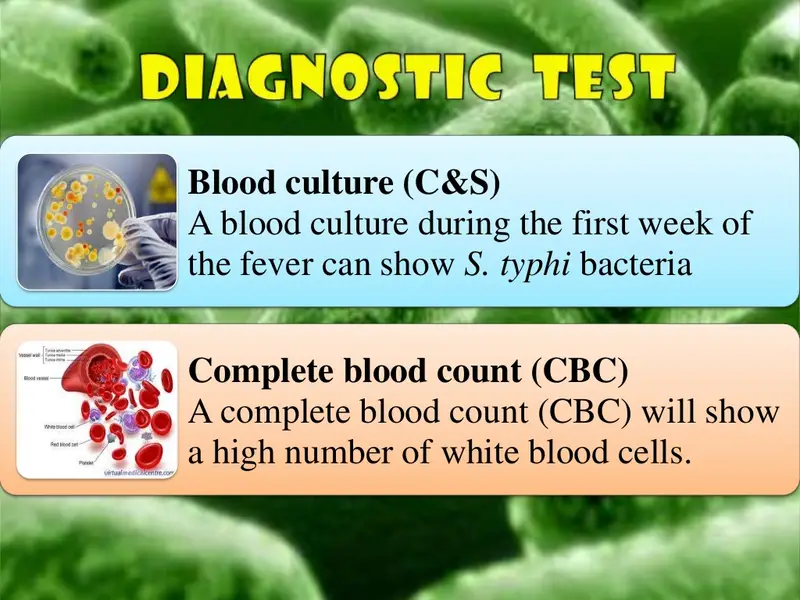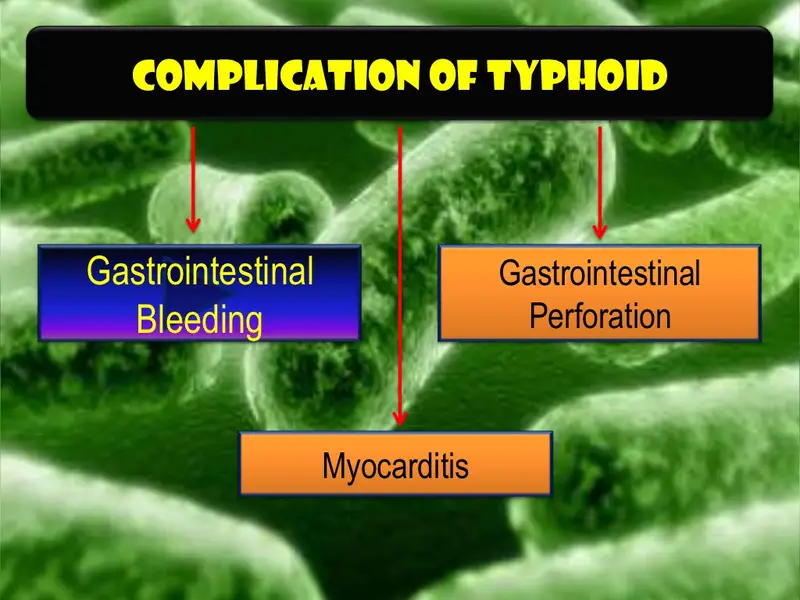Typhoid Fever Vaccine
Get In Touch
Call Now
Monday to Friday
9:00 AM To 6:00 PM
Saturday and Sunday
Closed

Typhoid Fever
Typhoid fever, also known simply as typhoid, is a bacterial infection due to a specific type of Salmonella that causes symptoms. Symptoms may vary from mild to severe, and usually begin 6 to 30 days after exposure. Often there is a gradual onset of a high fever over several days. This is commonly accompanied by weakness, abdominal pain, constipation, headaches, and mild vomiting. Some people develop a skin rash with rose colored spots. In severe cases, people may experience confusion. Typhoid fever is a life-threatening illness.
Typhoid Fever Rash
- It’s usually spread under unsanitary conditions, either person to person, or through contaminated food, drink, or water. Typhoid fever is contracted by drinking or eating the bacteria in contaminated food or water. People with acute illness can contaminate the surrounding water supply through stool, which contains a high concentration of the bacteria. Contamination of the water supply can, in turn, taint the food supply.
- When a person becomes infected with the bacteria that cause typhoid fever, the bacteria begin to multiply and spread into the bloodstream. After 3 to 60 days, symptoms can occur. This period between becoming infected and the start of symptoms of typhoid fever is known as the incubation period.
Typhoid fever symptoms characterized by:
- High fever (which gradually increases, often to over 104 degrees Fahrenheit,
- headache, tiredness, loss of appetite, dizziness , bloody nose and Rash of flat, rose-colored spots.
- Other symptoms include abdominal pain, nausea, chills, and constipation or diarrhea.
- If it is not treated, it can kill up to 30% of people who get it.
- This disease is common in many developing countries of the Indian subcontinent, Africa, Asia, the Caribbean, and Central and South America. Typhoid fever is still common in the developing world, where it affects about 21.5 million persons each year.
- Vaccination is recommended for all travelers to risk areas.
- Typhoid fever is a life-threatening illness caused by the bacterium Salmonella Typhi, including death. In the United States about 400 cases occur each year, and 75% of these are acquired while traveling internationally. Typhoid fever is still common in the developing world, where it affects about 21.5 million persons each year.

Diagnosis
- Doctor will take a detail history goes over number of questions, including recent medical and travel history.
- Perform a physical exam.
- Recommend certain tests.
- As part of diagnosing a typhoid fever bacterial infection, the doctor will also rule out other causes of possible typhoid fever symptoms, such as viral mononucleosis, hepatitis, and malaria.
Treatment & Prevention
- Typhoid fever can be prevented and can usually be treated with antibiotics, that can kill the bacteria. It also focuses on providing relief of symptoms as the body and antibiotics fight the illness. When appropriate typhoid fever treatment is started early, the prognosis is very good. With proper treatment, the mortality rate of typhoid fever should be under 1 percent and few complications should occur.
- If you are planning to travel outside the United States, you should know about typhoid fever and what steps you can take to protect yourself.
- There are two vaccines currently recommended by the World Health Organization for the prevention of typhoid:
- Live, oral Ty21– vaccine.
- Injectable Typhoid Vaccine.
- Both are between 50% to 80% protective and are recommended for travelers to areas where typhoid is endemic.
- Boosters are recommended every 5 years for the oral vaccine and every 2 years for the injectable form.


Complications
- Usually only occur in people who haven’t been treated with appropriate antibiotics or who weren’t treated straight away. In such cases, about 1 in 10 people experience complications, which usually develop during the third week of infection.
- Intestinal hemorrhage The most common complication of typhoid fever as the infection damages the lining of the intestine.
- This can show up as bloody feces.
- Most internal bleeding that occurs in typhoid fever isn’t life threatening, but it can make you feel very unwell.
- Symptoms include feeling tired all the time, breathlessness, pale skin,
- an irregular heartbeat, vomiting blood and Stools are very dark or tar-like.
- A blood transfusion may be required to replace lost blood, and surgery can be used to repair the site of the bleeding.
Perforation
- Perforation is potentially a very serious complication.
- This is because bacteria that live in your digestive system can move into your stomach and infect the lining of your abdomen (the peritoneum). This is known as peritonitis. Peritonitis is a medical emergency as the tissue of the peritoneum is usually sterile (germ-free).
- The peritoneum doesn’t have an inbuilt defense mechanism for fighting infection.
- In peritonitis, the infection can rapidly spread into the blood (sepsis) before spreading to other organs.
- This carries the risk of multiple organ failure. If it isn’t treated properly, it may result in death.
- The most common symptom of peritonitis is sudden abdominal pain that gets progressively worse.
- If you have peritonitis, you’ll be admitted to hospital, where you’ll be treated with antibiotic injections.
- Surgery will then be used to seal the hole in your intestinal wall.
Cardiac Complications Endocarditis, Myocarditis and Pericarditis
- Salmonella spp. can adhere to damaged Endothelium (Endocarditis), predisposing individuals to complications rarely seen with other Gram-negative organisms; Myocarditis is one of these complications.
- It is interesting to note that myocarditis in typhoid fever may be more common than suspected.
- If the Pericardium is also involved (Myopericarditis), signs and symptoms suggestive of pericarditis may also be present.
- Most of these patients recover with pharmacologic therapy alone, and have a good prognosis; their management is similar to that of patients with other forms of myocarditis, with the addition of antibiotic therapy to treat the typhoid infection.
What Patients Say
Our Testimonials
Why patients trust Dr. Farah with their health

Came in with a headache and started to feel sick. Had a big trip for New Years, therefore I had to solve my problems quickly. Dr. Farah helped me right away and treated all my problems, he saved my weekend. Will come here again soon.
Melanie Warner

I was in a lot of pain and I walked in and the receptionist was so lovely. I was into see the doctor within five minutes and he listened to me and was wonderful. I’ve been to a few urgent cares and this one by far is the best !
Tiffany Lee-Frank

I absolutely love Dr Farah and his whole staff on the medical and the spa side. I’m not just saying this, Dr Farah has been my doctor over 10 years and I’ve been using his Rejuvenate spa for about 4 years now. I would give them 10 stars if I could!!!
Lori Brooks

Ashley and Anna are friendly and made me feel welcome and at ease. Dr. Farah was very understanding and answered all my stupid questions. They were all very professional and patient with me.
juli ross
Providing Urgent Care for non-life-threatening health complications

Urgent care services
Monday to Friday
9:00 AM To 6:00 PM
Saturday and Sunday
Closed
17130 Ventura Boulevard,
Encino California 91316






